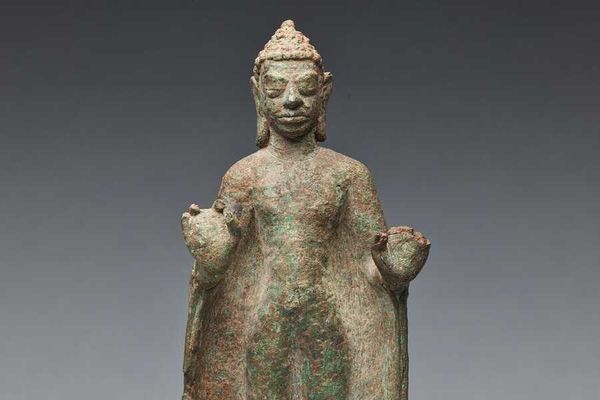At 67, Werner Herzog shows no sign of slowing down. If anything, the famously feisty German auteur, an Oscar nominee for Encounters at the End of the World, his 2008 documentary about Antarctica’s rarely seen landscape, is doing his best impression of a workaholic.
He denies it, of course – “I’ve worked consistently and without any haste, but I’m not a workaholic” – but the evidence is mounting. Bad Lieutenant: Port of Call New Orleans, his darkly humorous portrait of a corrupt, drug-addicted cop whose vices are spiraling out of control, is generating as much Best Actor buzz for star Nicolas Cage as he’s enjoyed since winning the award for 1995’s Leaving Las Vegas. And in December, Herzog will unveil My Son, My Son, What Have Ye Done, his story of an eccentric layabout, played by Revolutionary Road’s Michael Shannon, who suffers a psychotic break.
Herzog is known to be an eccentric himself, a reputation he's earned as much for his eclectic taste in movie projects as for his devil-may-care attitude and legendary misadventures. Once, on the set of 1972's Aguirre, The Wrath of God, he threatened to kill his star, Klaus Kinski, and then turn the gun on himself. (The director has since claimed he was fully prepared to pull the trigger.) In 2006, while promoting his prisoners-of-war drama Rescue Dawn, Herzog was shot, mid-interview, with an air rifle fired by an unknown assailant. He continued the conversation unfazed, explaining to the BBC's Mark Kermode that it was "not a significant bullet."
Besides his fearless (some might say maniacal) approach to filmmaking, one thing that distinguishes Herzog from his peers is his willingness to speak his mind, especially when his opinions seem sure to court controversy. It was only a few months ago that Abel Ferrara, director of 1992’s similarly themed Bad Lieutenant, wished a fiery death on Herzog for agreeing to oversee a generously financed remake. Asked to address Ferrara's complaint, Herzog, ever the provocateur, delighted in the opportunity to throw fuel on the fire.
On Ferrara:
"One of my producers, Edward Pressman, owned the rights to the title Bad Lieutenant, and he envisioned my movie as the beginning of a possible franchise. I fought against the title, and came up with Port of Call New Orleans, so if there was a franchise, we could have Port of Call Detroit or Port of Call Seattle. We settled on a hybrid of the two, which I can live with, but it led to the misunderstanding with Abel Ferrara that this was going to be a remake. Of course, it's not a remake. I've never seen his film, I've never seen any of his films. I don't even know who he is.
"I'm told he's a fine filmmaker, and he seems rather vociferous, which I like. And after all, filmmaking is a bit of a sport. If you're at a baseball game and the coach doesn't storm out of the dugout and kick dirt on the umpire, what sort of baseball game is it? If you're at a hockey game and there's no big brawl on the ice, it's not worth the money."
On casting Cage as his drug-addled antihero:
"It only seemed natural that we should work together. In fact, we realized at the very same moment on the very same day, having observed each other's work for many years, that it was an outrage that we had not collaborated before. So within 60 seconds of talking to him on the phone, the deal was done, and that was a wonderful development. Nicolas is like a great member of the family now – a true comrade, a brother in arms.
"He approached me early on, and he asked me what the character's motivation was – 'Why is he so bad?' – and I told him we weren't going to discuss bullshit like motivation. There's a proverbial Bavarian expression I passed along to him. Roughly translated, it means, 'Let the hog loose,' or 'Let the pig loose.' You know, 'Release the wild boar.' Nicolas was very good at letting the hog loose in this movie. I told him not to hold back, that I wanted him to be really, really bad, and he improvised so many scenes brilliantly. Yet you cannot improvise without having a strong sense of where you're going, and Nicolas had a very keen sense of that. He understood the fluidity of the story, the flow of each scene, and that made his improvisation that much more valuable."
On deviating from William Finklestein's screenplay:
"I do take liberties. For one thing, in the script, the bad lieutenant is always snorting coke and heroin, and I don't like the drug culture. I didn't think it was necessary for him to be doing this constantly. I said, 'Throw it all away,' and that was that. Also, the bad lieutenant's relationship with his girlfriend was originally based only on sex and drugs, but I believed there was a real love story there, so I invented a scene where they discuss pirate's treasure and a silver spoon, a scene that illustrates the bond that exists between them. And of course I introduced the iguanas that he sees from time to time."
On his stress-free, economical approach to filmmaking:
"I only shoot the bare necessities, and that's why my workdays usually end around 2 or 3 p.m. I delivered the film to the studio two days ahead of schedule and $2.6 million under budget. The result is that one of our producers, Avi Lerner, who also produced the last Rambo movie, wants to marry me now."
On his ability to cast actors like Val Kilmer, who appears briefly in Bad Lieutenant as Nicolas Cage's on-again, off-again partner, in smaller roles than those to which they are accustomed:
"Is it because of the prestige that comes from working with me? I believe so, yes. Val Kilmer wanted to work with me, and he called me to ask if he could get on board, so I told him he could. I think actors know that I have a talent for making them look their best, whether it's Klaus Kinski, [Rescue Dawn's] Christian Bale or even Nicolas Cage.
“All of the actors I’ve worked with are magnificent. I don’t care to distinguish their temperaments with some top 10 list, but they are all incredibly talented. Klaus Kinski, who was the greatest pestilence ever to walk God’s earth, made 205 movies, and the very best of them were the ones we made together. So I think I have an eye for talent in that sense. But what can I say? I love what I do. I try to be a good soldier in the service of cinema.”
On the whirlwind creative process that produced My Son, My Son:
“My friend Herbert Golder is a professor at Boston University who has translated Sophocles into English, and he’s worked with on several films, as a producer and an actor – in Invincible, for instance. He came to me with this thick stack of papers taken from a murder case, and they were so bizarre. I read them and I said, ‘This is wonderful! I can write this.’ He said, ‘No, let me write it with you,’ and so we wrote the film in four-and-a-half days.”
On his introduction to former Oscar nominee Michael Shannon, whom Herzog recruited for a small role in Bad Lieutenant and the lead role in My Son, My Son:
“I saw a short clip of Michael on YouTube, believe it or not. I could tell he was a huge talent, so I called him and asked him to play a small role in Bad Lieutenant, because there weren’t many roles left. I told him I wanted him to learn how I worked, and he said, ‘Why should I learn how you work?’ I told him it was because he was going to carry my next film.”
On the genesis of his working relationship with My Son, My Son producer David Lynch:
“I was having a conversation with David Lynch, talking about how the movies that come out these days have these huge budgets, $100 million or $180 million, and most of them don’t do very well. What we need to do is tell smart, interesting stories with nothing but great actors, the very best of the best, and keep the budgets small, around $2 million. If we do that, we can be successful, even commercially successful, and these movies can make money like they’re supposed to.
“David agreed. He asked me when if I had a movie in mind, and I said I did. He asked me when I could start, and I said, ‘Tomorrow.’ So he asked if we could bill it as ‘David Lynch Presents’ because he has such a strong following in places like France, and I’m very grateful to him for that.”
On the creative participation of Lynch, whose influence on My Son, My Son seems evident in a strange, dreamlike sequence featuring an oddly out-of-place midget:
“There was none. That scene was not Lynchian, it was Herzogian! I made a movie featuring an entire cast of midgets in 1968. David Lynch had not even been born!”
On his tendency to include animals in pivotal scenes:
"I don't know why, I just like casting animals in major roles. In Bad Lieutenant, I rather impulsively decided I wanted iguanas and alligators in the movie, and I told the cinematographer that he wasn't to go near them. I had to shoot them myself. So I took a camera and a fiberoptic wire, and I shot the iguanas in extreme closeup to make them look as confused and stupid as possible.
“In My Son, My Son, What Have Ye Done, I just wanted to shoot a scene featuring a very large chicken. During the filming, I saw a 45-pound rooster named Ralph, and he was very impressive. But all the chickens, roosters and ostriches in the movie – their significance eludes me. Whatever meaning they have is personal. It exists inside the minds of the viewers.”
On his no-frills approach to making
My Son, My Son:
“To me, this is one of the most concise, coherent pieces of filmmaking I’ve ever produced. The storytelling is extremely disciplined from start to finish, even with all the narration and flashbacks that I used. If there are things that exist inside the story that seem inexplicable or mysterious, that may be, but isn’t that the beauty of poetry? The majesty of cinema? If there was no mystery, you might as well have an accountant on stage explaining his bookkeeping.”




















